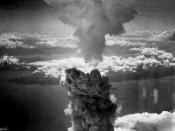On August 6, 1945, at approximately 8:15 a.m., a "noiseless flash" appeared in the sky over the city of Hiroshima. John Hersey's Hiroshima does a thorough job explaining what life was like just before, during and after "the bomb" was dropped. It also covers what is believed to be the most controversial moral question asked by many around the world: Why did we drop the bomb? Many people have asked this question over the years, but what they don't understand is that this is not the only question that matters. Also they must ask themselves what the positive and negative impacts where. How many lives did it save? What were some of the lasting effects? What good came out of this?
First of all, there were several positive aspects in dropping the bomb, such as the splitting of the atom. Imagine being the first scientist to discover, and watch, the splitting of an atom for the very first time.
The sheer power in something so small is almost overwhelming. Also imagine building a device that could, just barely, harness this power and release it on an unsuspecting populace. Would you want to be responsible for such a device? Probably not. With all the innocent lives that would be lost, nobody should want to be responsible for something so horrific.
Secondly, there were several negative aspects of dropping the bomb. In a matter of weeks, days even, 70,000 innocent people died. Maybe we saved thousands of American soldiers, but was it worth dropping death on thousands of innocent women and children? Most definitely not. There were several other ways to persuade Japan to surrender, but as Americans, we had to choose the most destructive choice available. What's more, rumor has it that the bomb was just dropped as...


